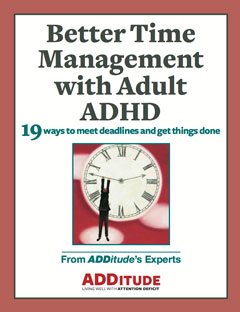Our internal clocks weren't put together by a Swiss watchmaker, who sees time as a series of seconds and minutes, one coming precisely after the other. Some experts think that ADHDers perceive time not as a sequence but as a diffuse collection of events that are viscerally connected to the people, activities, and emotions involved in them.
ADHDers don't see events; they "feel" them.
Several problem behaviors result from our novel perception of time:
> doing things in the wrong order
> underestimating the time it takes to do tasks
Research suggests that ADHDers are deficient in temporal processing abilities, which affect executive functioning. This interferes with our ability to perceive time accurately when tasks require our attention or present an opportunity for impulsive responses.
The good news is that there are exercises and strategies that can improve our sense of time. You can avoid time lapses in your life, as these three ADHDers did.
No Structure at Home
PROBLEM: Susan tried to plan her life at home, but things went wrong because she couldn't estimate how long tasks took.
WHAT WE TRIED: We started by playing a guessing game to improve her ability to estimate how long activities took to complete. She bought a stopwatch/timer, with a cord, and wore it around her neck. Then she estimated how long it would take to perform certain tasks at home and at work.
If the timer went off before she finished, she set the stopwatch to record how much longer the task had taken above her original estimate. After a week of doing this, she discovered a pattern, which helped her plan better. Her estimation of projects at work was usually accurate, but she underestimated tasks at home. We talked about it and discovered that, when her time was her own, mostly at home, decision-making and prioritizing interfered with her ability to plan well. Her tasks at work were routine and didn't require decision-making or prioritizing. Structure at work kept her on track, and lack of structure at home threw her off.
So Susan created more structure on the home front. She outlined a routine to take care of basic household chores before preparing dinner every night. Her evenings felt longer. She streamlined her weekend structure by slotting chores and recreational activities into her Saturday schedule. She gave herself Sunday off.





